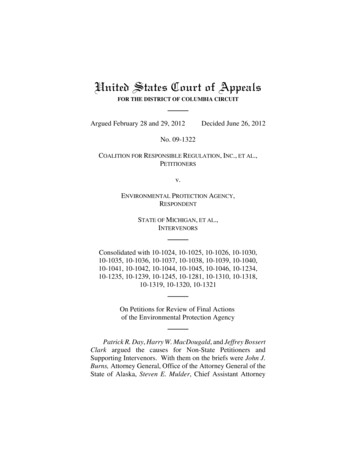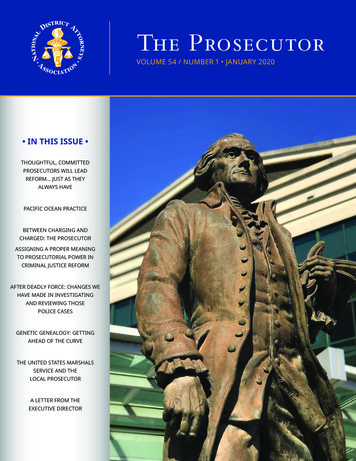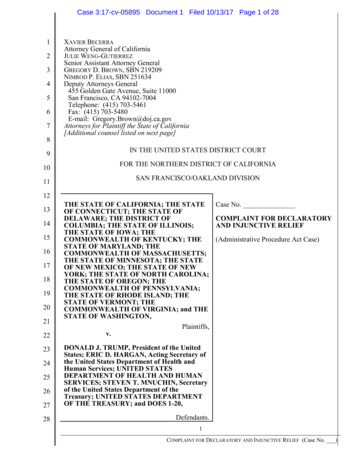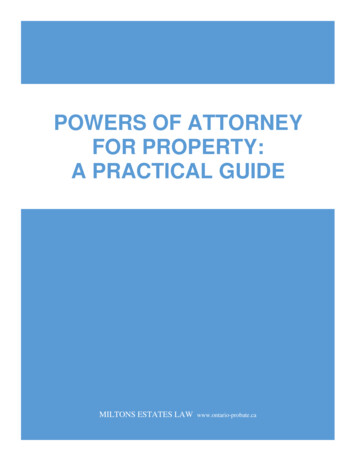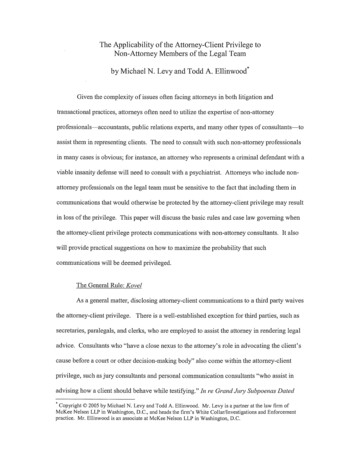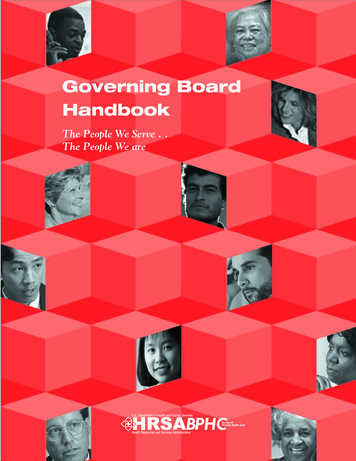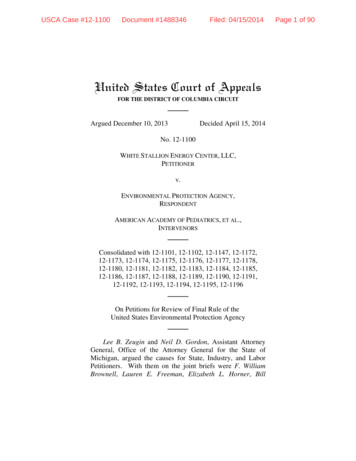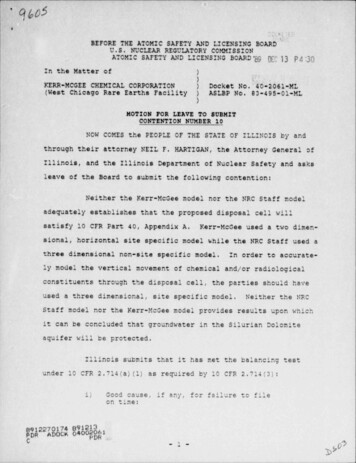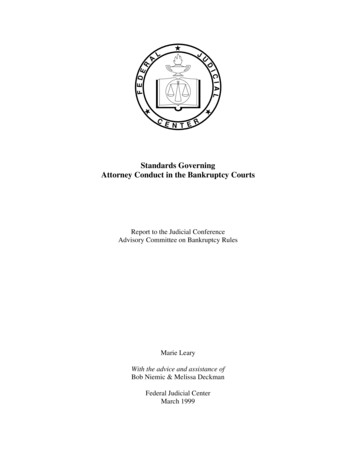
Transcription
LJCE N T E RDFEDERUAIALICStandards GoverningAttorney Conduct in the Bankruptcy CourtsReport to the Judicial ConferenceAdvisory Committee on Bankruptcy RulesMarie LearyWith the advice and assistance ofBob Niemic & Melissa DeckmanFederal Judicial CenterMarch 1999
ContentsSummaryI.IntroductionII.Sources of Standards Governing Attorney Conduct in Bankruptcy CourtsA.Sources of Standards and the Impact of Changing District Court RulesB.Bankruptcy Courts’ Use of Standards Other than Those in Local RulesIII.Type and Frequency of Attorney Conduct Issues in BankruptcyA.Frequency of Ten Specific Types of Attorney Conduct IssuesB.Frequency of “Other” Types of Attorney ConductIV. Adequacy of Standards Governing Attorney ConductA.Statutory StandardsB.Non-Statutory StandardsC.Conflict Between Statutory and Non-Statutory StandardsD.Bankruptcy-Specific Attorney Conduct Issues Not Adequately AddressedV.Adequacy of Disclosure Standards Regarding Employment of AttorneysVI. National Uniform Attorney Conduct Standards in Bankruptcy CourtsVII. Specific Suggestions for National Uniform Attorney Conduct Standardsin Bankruptcy CourtsA.Should There Be National Uniform Rules for Bankruptcy Courts on CertainTopics? Should the Rules Be the Same for Bankruptcy and District Courts?B.How Should Uniform Bankruptcy Rules Be Different FromUniform District Court Rules?C.Should National Uniform Bankruptcy and District Court Rules BeBased on the ABA Model Rules?D.Should a National Uniform Standard on Any Other AttorneyConduct Issue Be Drafted for Use in Bankruptcy Courts?VIII. General dicesAppendix A:Appendix B:Appendix C:Appendix D:Appendix E:Appendix F:Appendix G:Appendix H:Appendix I:Appendix J:Appendix K:Appendix L:Questionnaire for Chief Judges of United States Bankruptcy CourtsQuestionnaire for Judges of United States Bankruptcy CourtsComments Indicating Statutory Standards for Resolving Bankruptcy-Related Issues ofAttorney Conduct Were Not AdequateComments Indicating Non-Statutory Standards for Resolving Bankruptcy-Related Issuesof Attorney Conduct Were Not AdequateComments Reporting Problematic Inconsistencies between Statutory and Non-StatutoryAttorney Conduct StandardsComments Reporting Bankruptcy-Specific Attorney Conduct Issues Not Covered byRulesComments on Inadequate Requirements of Bankruptcy Rule 2014Comments in Support of (and Opposed to) the Same Uniform Standards for Bankruptcyand District CourtsComments Explaining How a National Uniform Standard for Bankruptcy Courts onSelected Attorney Conduct Issues Should Differ From That Applied to District CourtsComments on Whether the National Uniform Standard for Bankruptcy and DistrictCourts Should Be Based on the Corresponding ABA Model Rule for the Specified Typeof Conduct or on a Different StandardComments from Judges Who Indicated that National Uniform Standards on OtherAttorney Conduct Issues Should Be Drafted for Use in All Bankruptcy CourtsGeneral Comments
Standards Governing Attorney Conduct in the Bankruptcy Courts—Final ReportSummaryThe Judicial Conference Committee on Rules of Practice and Procedure inconjunction with the Advisory Committee on Bankruptcy Rules requested the FederalJudicial Center to conduct a study of attorney conduct issues in the bankruptcy courts. InDecember 1998, the Center sent 317 questionnaires to all chief bankruptcy judges(including bankruptcy judges in districts with only one bankruptcy judge) and to all otherbankruptcy judges.*1.Sources of Standards Governing Attorney Conducta. Source of Standards and the Impact of Changing District Court RulesVIII.Forty-seven (61%) of the 77 responding chief bankruptcy judges said thattheir courts follow the local rules of attorney conduct of their respectivefederal district courts. Most bankruptcy courts do not have their ownindependently developed set of local rules governing attorney conduct (only7% of bankruptcy courts indicated that they do). Thus, proposed changes oruniformity in district court attorney conduct rules could carry over to most ofthe bankruptcy courts, even if the proposed changes are not directly aimed ator applied to the bankruptcy courts. Nine percent of chief judge respondentsindicated that their courts have a local bankruptcy rule that adopts standardsother than those in the district court’s local rules, and 12% said they have nolocal district or bankruptcy rule governing attorney conduct.b. Bankruptcy Courts’ Use of Standards Other than Those in Local Rules(1) Of the 53 responding chief bankruptcy judges in districts with some form ofattorney conduct standards, 60% (32) said they never use attorney conductstandards other than the Bankruptcy Code, the Federal Rules of BankruptcyPractice, or the formal standards referred to in their local bankruptcy rules ordistrict court rules; 40% (21) indicated they did.(2) When bankruptcy courts look outside their local rules and outside theBankruptcy Code and Federal Rules of Bankruptcy Procedure for guidance,most turn to state ethics rules.2.Type and Frequency of Attorney Conduct Issues in Bankruptcya. Looking at responses to questions posed to all responding bankruptcy judges(chief and non-chief), the majority of responding judges reported the occurrenceone or more times within the past two years of the five following types of attorneyconduct issues: (1) 11 U.S.C. § 327 or § 1103 governing representation of anadverse interest or conflicts of interest (80% of 249 respondents); (2) other rules*We received responses to 251 of the 317 questionnaires mailed to all bankruptcy judges (excludingrecalled bankruptcy judges) (an overall response rate of 79%).1
Standards Governing Attorney Conduct in the Bankruptcy Courts—Final Reportregarding conflicts of interest (70% of 249 respondents); (3) disclosure standardsregarding employment of attorneys (71% of 247 respondents); (4) rules regardingattorneys’ fees (62% of 244 respondents); and (5) candor towards a tribunal (57%of 248 responding judges).b. The majority of responding judges indicated that each of the five following typesof attorney conduct issues had never arisen in the past two years. They are worthnoting, however, since the numbers of judges reporting one or more incidenceswere not insignificant: (1) truthfulness in statements to others (45% of 247respondents); (2) lawyer as a witness (37%); (3) communication with representedperson (30%); (4) confidentiality (19%); and (5) safekeeping of client property(27%).c. Other findings include: Only a very small group of attorney conduct issues arise in bankruptcy courtswith notable frequency. Responding bankruptcy judges were confronted with attorney conduct issuesinvolving statutory or bankruptcy-related standards more often than othertypes of standards. The other types of attorney conduct issues prevalent in bankruptcy courts,which may also arise in district court practice, often involve different concernsin the context of bankruptcy court practice due to the unique characteristics ofsuch practice. These issues include conflict of interest issues analogous tothose covered by ABA Model Rules 1.7 through 1.11, attorneys’ fees, andcandor towards a tribunal. Thus, one can conclude from questionnaire responses that, if a set of corenational attorney conduct rules are drafted for use in district courts and arecarried over to bankruptcy courts without taking into consideration theseparate types of attorney conduct issues bankruptcy courts must decide upon,bankruptcy courts will still look elsewhere for guidance on these issues.3.Adequacy of Standards Governing Attorney Conducta. The majority of bankruptcy judges (75%) were satisfied with the statutorystandards that they use to resolve attorney conduct issues.b. The majority of bankruptcy judges (88%) were satisfied with the non-statutorystandards that they use to resolve attorney conduct issues.c. The majority of bankruptcy judges (88%) did not find any problematicinconsistencies between their district’s statutory and non-statutory attorneyconduct standards.d. The majority of bankruptcy judges (72%) said they had never encounteredattorney conduct issues that arose only in bankruptcy courts that were not coveredadequately by existing statutory or non-statutory standards.2
Standards Governing Attorney Conduct in the Bankruptcy Courts—Final Report4.Adequacy of Disclosure Standards Regarding Employment of Attorneysa. Among 250 responding bankruptcy judges, 62% said they had experiencedproblems with the adequacy of disclosure by attorneys seeking employment inbankruptcy cases; 38% said they never experienced such problems.b. Among the 153 responding bankruptcy judges who said they had experiencedsuch problems, 75% said that none of these problems were caused by inadequaterequirements for disclosure in Bankruptcy Rule 2014; 26% said the problemswere so caused.5.National Uniform Attorney Conduct Standards in Bankruptcy Courtsa. Among 248 responding bankruptcy judges, 52% stated that attorney conduct inbankruptcy courts should be governed by uniform standards; 27% said thereshould not be uniform standards, while 21% answered they “can’t say.”b. Assuming uniform standards are adopted by all district and bankruptcy courts,among the 248 responding bankruptcy judges, 52% stated that the standardsapplied in bankruptcy courts should be the same as those applied in district courts,28% said they should not be, while 20% said they “can’t say.”6.Specific Suggestions For National Uniform Attorney Conduct Standards inBankruptcy Courtsa. For each of nine specified types of attorney conduct, the majority (ranging from60% to 64%) of responding judges said there should be a national uniformstandard in the bankruptcy courts, and the majority (ranging from 58% to 97%) ofrespondents who said there should be such a national uniform standard also saidthe standard should be the same in bankruptcy and district courts. The ninespecified types are: confidentiality of information, general rule on conflicts ofinterest, conflict of interest concerning prohibited transactions, conflict of interestconcerning former client, rule on imputed disqualification, rule on candor towardsthe tribunal, rule on lawyer as witness, rule on truthfulness in statements to others,and rule on communications with person represented by counsel.b. The majority of judges who indicated that the national uniform standard should bethe same for all bankruptcy and district courts said the national uniform standardshould be based on the corresponding ABA Model Rule.c. Among 198 responding bankruptcy judges, 84% said that no additional attorneyconduct issues other than those already mentioned in the questionnaire should bedrafted as national uniform rules for use in all bankruptcy courts.3
Standards Governing Attorney Conduct in the Bankruptcy Courts—Final ReportI.Introduction1The Judicial Conference’s Committee on Rules of Practice and Procedure [theStanding Committee] is studying the current nonuniformity in rules governing theprofessional conduct of attorneys practicing in the federal district courts. To coordinatethis study, the Standing Committee has formed a Special Committee on Rules GoverningAttorney Conduct consisting of members from each of the rules advisory committees inaddition to representatives from other relevant groups. This Special Committee will meetin the spring and fall of 1999 and representatives from the advisory committees will makerecommendations back to their respective advisory committees.As part of the Standing Committee’s efforts in this area, in June 1997, the FederalJudicial Center gave the Standing Committee a report describing (1) the experiences offederal district courts with local rules that govern attorney conduct, and (2) proceduresused by the courts to address alleged misconduct [hereinafter the FJC District CourtStudy].2 Bankruptcy courts were not included in that study.The Standing Committee currently has several specific proposals before it toaddress the current nonuniformity in rules governing attorney conduct in the districtcourts. One proposal is to adopt a general default provision that requires all district courtsto adopt the attorney conduct rules currently in place in the state wherein the district islocated. The other proposal is to combine this default provision with a set of “core”national rules. These national rules would apply to specific core areas where problemsfrequently arise in federal district courts, leaving all other areas to be governed by statestandards.Bankruptcy courts are different from the district courts in the attorney conductarea in that attorneys who practice in bankruptcy courts are subject to a complex statutorysystem, which includes bankruptcy-specific conflict of interest criteria and otherstandards directly governing attorney conduct. The Standing Committee has alreadygiven attorney conduct in the bankruptcy context some attention through a study reportissued in June 1997.3 That study [hereinafter Study of Bankruptcy Cases], whichexamined reported bankruptcy opinions involving rules of attorney conduct,demonstrated that the proposals being considered by the Standing Committee for thefederal district courts raise many additional issues for bankruptcy courts.1Special acknowledgments are made to Donna Stienstra, Joe Cecil, Carol Witcher, Bonita Anderson,Yvette Jeter, Aletha Janifer, and Edwin McNair for their assistance with this study.2Marie Leary, Standards of Attorney Conduct and Disciplinary Procedures: A Study of the Federal DistrictCourts 335 (Federal Judicial Center 1997), reprinted in Working Papers of the Committee on Rules ofPractice and Procedure: Special Studies of the Federal Rules Governing Attorney Conduct (AdministrativeOffice of the United States Courts 1997) [hereinafter the FJC District Court Study].3Daniel R. Coquillette, Study of Recent Bankruptcy Cases (1990-1996) Involving Rules of AttorneyConduct 293 (1997), reprinted in Working Papers of the Committee on Rules of Practice and Procedure:Special Studies of Federal Rules Governing Attorney Conduct (Administrative Office of the United StatesCourts 1997) [hereinafter Study of Bankruptcy Cases].4
Standards Governing Attorney Conduct in the Bankruptcy Courts—Final ReportThe Standing Committee has asked the Advisory Committee on Bankruptcy Rules[the Advisory Committee] to consider whether bankruptcy courts should be exempt fromthe attorney conduct proposals the Standing Committee is considering, whether the“core” rules being considered for district courts should make special allowances for theunique conditions of bankruptcy practice, or whether specific and different “core” rulesof attorney conduct are required for bankruptcy courts.To supplement the 1997 Study of Bankruptcy Cases, in June 1998 the StandingCommittee asked that the Federal Judicial Center coordinate with the AdvisoryCommittee and conduct a study of attorney conduct issues in the bankruptcy courts. TheAdvisory Committee at its October 1998 meeting asked its subcommittee on attorneyconduct to oversee the study. The following report describes this study.The information in this report is based on responses to questionnaires that weredeveloped by the Center with the assistance of the Advisory Committee. Two versions ofthe questionnaire were distributed. Version one (see Appendix A) was sent to all chiefbankruptcy judges and all bankruptcy judges in districts with only one bankruptcy judge.4The total number of judges in this group was 90. This questionnaire asked the chiefjudges to answer questions about the formal and informal sources of attorney conductstandards in their bankruptcy court, the adequacy of those standards, the type andfrequency of attorney conduct issues that have arisen in their court, and the need fornational uniform attorney conduct rules for bankruptcy courts. We received responses to77 out of the 90 questionnaires mailed to chief judges (an 86% response rate).Version two of the questionnaire (see Appendix B), which was sent to all otherbankruptcy judges, was identical to version one except that it did not include thequestions on the formal and informal sources of attorney conduct standards. The totalnumber of judges in this second group was 227. We received responses to 174 of thesequestionnaires (a 77% response rate).5II.Sources of Standards Governing Attorney Conduct in Bankruptcy Courts(Questionnaire for Chief Bankruptcy Judges)A.Sources of Standards and the Impact of Changing District CourtRulesVersion one of the questionnaire asked chief bankruptcy judges to verify orcorrect information about the formal sources of attorney conduct standards in theirbankruptcy court, and to answer questions about any informal standards used.6 One goal4Throughout this report, unless indicated otherwise, reference to “chief bankruptcy judges” includes chiefbankruptcy judges and bankruptcy judges who preside in districts with only one bankruptcy judge.5We received at least one questionnaire from each bankruptcy court except for the Southern District ofWest Virginia, Southern District of Illinois, Western District of Arkansas, Eastern District of Oklahoma,District of Wyoming, District of the Virgin Islands, and the District of Guam.6See Section A of the Chief Judge Questionnaire, located in Appendix A of this report.5
Standards Governing Attorney Conduct in the Bankruptcy Courts—Final Reportof this series of questions was to determine how closely bankruptcy courts follow therules of attorney conduct used by their corresponding district courts. This would helpgauge how widespread the impact of any changes in federal district court rules would beon the bankruptcy courts.7The chief judge questionnaire included a table that showed the local rule in eachdistrict and bankruptcy court.8 For each district court, the table in the questionnaireidentified any local rule on standards of attorney conduct published as of April 28, 1997.For each bankruptcy court, the table showed whether the court has a local bankruptcyrule on standards of attorney conduct and, if so, the source of the standards adopted in therule as far as we could determine them.9 We asked each chief judge to review andcomment on the accuracy of the information in the questionnaire for their court.For each source of attorney conduct standard identified in the questionnaire,10Table 1 below shows the number of chief bankruptcy judges who indicated that theircourt used that source. Some chief bankruptcy judges identified more than one source.Seventy-seven chief bankruptcy judges responded.7The 1997 Study of Bankruptcy Cases concluded that 73% (69) of the bankruptcy courts had adopted thelocal rules of attorney conduct of their respective district courts. See Study of Bankruptcy Cases, supra note3, at 299-301. However, this conclusion may oversimplify the status of these 69 courts. For example, wherethe local rules of the bankruptcy court were silent on attorney conduct, the Study of Bankruptcy Casesassumed that the rules of the district court applied (32 bankruptcy courts) and, where the bankruptcy courtadopted the local district court rules generally, the Study of Bankruptcy Cases assumed that this implicitlyincluded any district court local rules on attorney conduct (18 bankruptcy courts). Id. at 299 & n.3, 300.Thus, of the 69 bankruptcy courts that the Study of Bankruptcy Cases had concluded had adopted thedistrict court’s local rules of attorney conduct, 50 (32 18) have local rules with no specific statement tothat effect.8See Appendix 1 of the Chief Judge Questionnaire, located in Appendix A of this report.9We derived our information from the sources of standards identified in the Study of Bankruptcy Cases.See Study of Bankruptcy Cases, supra note 3, at Appendix III of that report. We then updated thisinformation to the best extent we could.10See Section A, Question 1 of the Chief Judge Questionnaire, located in Appendix A.6
Standards Governing Attorney Conduct in the Bankruptcy Courts—Final ReportTable 1Sources of Attorney Conduct Standards in the Bankruptcy Courts(N 77)*Number of ChiefBankruptcy JudgesWho Indicated thatTheir Court Used theGiven Source (% ofchief bankruptcy judgerespondents)20(26%)29(38%)5(7%)7(9%)Sources of Attorney Conduct StandardsSource A**—Adopts District Court’s Local Rules in General: My bankruptcy court has a localbankruptcy rule that adopts the local rules of the district court in general; our local bankruptcy rule makesno specific mention of any district court provision concerning attorney conduct and professionalresponsibility.Source B***—Adopts District Court’s Rules of Attorney Conduct Specifically: My bankruptcy courthas a local bankruptcy rule that specifically states that the bankruptcy court has adopted the districtcourt’s rules on attorney conduct, attorney discipline, professional responsibility, or a similar phrase.Source C—Developed Its Own Attorney Conduct Standards: My bankruptcy court has developed itsown attorney conduct standards and has incorporated them into a local bankruptcy rule or adopted themby general order.Source D—Adopts Other Standards: My bankruptcy court has a local bankruptcy rule that adopts otherstandards to govern attorney conduct such as the ABA Model Rules of Professional Conduct or ModelCode of Professional Responsibility; these standards are other than those in the district court local rules.Source E—Has No Local District or Bankruptcy Rule: My bankruptcy court has no local district orbankruptcy rule, general order, promulgated guideline, standing order, or other written court-widestandard that governs attorney conduct.Source F—None of the Above: None of the above describes the situation in my bankruptcy court.9(12%)13(17%)*Some judges identified more than one source.**Note that of the 20 who identified Source A, one judge indicated that Source C standards are also used in his or her bankruptcy court.***Note that of the 29 who identified Source B, two judges indicated that they also use Source C standards and three judges indicatedthat they also use Source D standards.Of the 20 chief bankruptcy judges who indicated that their bankruptcy court has alocal bankruptcy rule that adopts the local rules of the district court in general (Source Ain Table 1), 18 (90%) indicated that they actually follow or have adopted the districtcourt’s attorney conduct standards.11 In addition, 29 chief bankruptcy judges indicatedthat they adopt the district court’s rules of attorney conduct specifically (Source B inTable 1). Therefore, we can conclude that 47 (18 29) of the 77 responding bankruptcycourts (61%) have adopted or follow the local rules of attorney conduct of theirrespective district courts. If we add to these 47 courts the nine courts that indicated thatthey have no local district or bankruptcy rule or other written court-wide standard thatgoverns attorney conduct (Source E in Table 1), and if we adopt the assumption of theStudy of Bankruptcy Cases that the rules of the federal district court apply where thelocal rules of the bankruptcy court are silent on the issue of attorney conduct,12 then itwould follow that 56 (73%) of the 77 responding bankruptcy courts follow the local rulesof attorney conduct of their respective district courts.The table reinforces the conclusion of the Study of Bankruptcy Cases that mostbankruptcy courts do not have their own independently developed set of local rulesgoverning attorney conduct13—only 7% of bankruptcy courts indicated so in their11See Section A, Question 2 of the Chief Bankruptcy Judge Questionnaire, located in Appendix A of thisreport.12See discussion supra note 7.13See Study of Bankruptcy Cases, supra note 3, at 299.7
Standards Governing Attorney Conduct in the Bankruptcy Courts—Final Reportresponses to our questionnaire (Source C in Table 1). Given these findings, proposedchanges in district court rules could carry over to most of the bankruptcy courts, even ifthe proposed changes are not directly aimed at or applied to the bankruptcy courts.14The 1997 FJC District Court Study found that: “Eighty-nine federal districts (95%of all districts) have a local rule informing attorneys practicing before the districts’ courtswhich professional standards of conduct they are required to abide by . . . . The localrules of 68 districts (76% of federal districts with attorney conduct rules) incorporate therelevant standards of the state in which the district is located.”15 Thus, since the majorityof bankruptcy courts follow their district court’s local rules on attorney conduct, and themajority of district courts with local rules governing attorney conduct incorporate therelevant state standards of the district wherein they are located, if the StandingCommittee decides to recommend that district courts adopt the standards of the statewherein they are located, and this rule is made applicable to the bankruptcy courts, thiswill not mean a change from current practice for many bankruptcy courts.However, as pointed out by previous studies, there are many differences betweenthe states’ attorney conduct rules.16 For example, the majority of states that have adoptedsome form of the ABA Model Rules have changed key sections.17 Thus, if district courtsare uniformly required to adopt state standards of attorney conduct, requiring allbankruptcy courts to follow their district court’s local rule on attorney conduct wouldmake the source of standards uniform across bankruptcy courts, but it will not produceuniformity in the practical application of the standards.B.Bankruptcy Courts’ Use of Standards Other than Those in LocalRulesAlthough our results show that the majority of bankruptcy courts adopt theattorney conduct rules of the district court, several qualifications must be noted. First,some courts have multiple sources of authority. Of the 20 chief bankruptcy judges whoidentified Source A (adopts district court’s local rules in general), one indicated Source Cstandards are also used in his or her bankruptcy court. Out of the 29 chief bankruptcyjudges who indicated Source B standards (adopts district court’s rules of attorney conductspecifically), two indicated that they also use Source C standards and three othersindicated that they also use Source D standards. Second, in applying attorney conductrules bankruptcy judges look for guidance to sources other than those listed in their localrules, such as the Bankruptcy Code, the Federal Rules of Bankruptcy Procedure, theAmerican Bar Association Model Rules and Model Code, and the common law ofbankruptcy.1814Id. at 307.See FJC District Court Study, supra note 2, at 337 (Summary).16See, e.g., Daniel R. Coquillette, Report on Local Rules Regulating Attorney Conduct in the FederalCourts 4 (1995), reprinted in Working Papers of the Committee on Rules of Practice and Procedure:Special Studies of the Federal Rules Governing Attorney Conduct (Administrative Office of the UnitedStates Courts 1997).17Id.18See Study of Bankruptcy Cases, supra note 3, at 301-06.158
Standards Governing Attorney Conduct in the Bankruptcy Courts—Final ReportThese qualifications make it more difficult to determine which attorney conductstandards the bankruptcy courts actually use and more difficult to predict the effect ofcarrying over uniform rules from the district court.To gain a sense of how widespread the practice of turning to outside sources is,we asked chief bankruptcy judges from districts with some form of attorney conductstandards (those who identified at least one of the Sources A through D in Table 1) tostate whether their bankruptcy court (or the judges in their bankruptcy court) ever usedstandards or sets of standards other than the Bankruptcy Code, the Federal Rules ofBankruptcy Procedure, or the formal standards referred to in their local bankruptcy rulesor district court rules. Of the 53 chief bankruptcy judges who responded to this question,60% or 32 said their court never used other standards, while 40% or 21 indicated theydid.19Compare this to the 1997 FJC District Court Study of local rules governingattorney conduct in which we asked district judges: “Are attorneys practicing in yourdistrict prevented from relying on the explicit language of your local rule because yourdistrict has ‘incorporated’ external standards into your local rules or utilized externalstandards not apparent in the rules themselves to interpret the standards?”20 Out of the 71districts responding to this inquiry, only seven (10%) reported that attorneys practicing intheir district could not rely solely on the explicit language of their local rules becausetheir court used external standards to interpret the district’s attorney conduct rules.21In order to determine what the other standards were that bankruptcy courts turn to,we asked these 21 chief bankruptcy judges who indicated they used outside standards notin their local bankruptcy rules to describe them.22 The other standards they reported usingincluded: state ethics rules (8 chief judges); state bar ethics rules (6 chief judges); ABAModel Rules of Professional Conduct (3 chief judges); case law on attorney responsibility(2 chief judges); treatises on attorney responsibility (1 chief judge); ABA Code ofProfessional Responsibility (1 chief judge); ABA Canon of Professional Ethics (1 chiefjudge); state code provisions (1 chief judge); and advisory opinions of state ethicscommittee and opinions of state bar disciplinary counsel (1 chief judge).The diversity of sources used is illustrated further by the following responses.Twenty-two (29%) of responding chief bankruptcy judges indicated that (1) theirbankruptcy court had no local district or bankruptcy rule, general order or other writtencourt-wide standard that governs attorney conduct (Source E in Table 1 above), or (2)19See Section A, Question 3 in Chief Bankruptcy Judge Questionnaire, located in Appendix A of thisreport.20See FJC District Co
a. The majority of bankruptcy judges (75%) were satisfied with the statutory standards that they use to resolve attorney conduct issues. b. The majority of bankruptcy judges (88%) were satisfied with the non-statutory standards that they use to resolve attorney conduct issues. c. The majority of bankruptcy judges (88%) did not find any problematic
